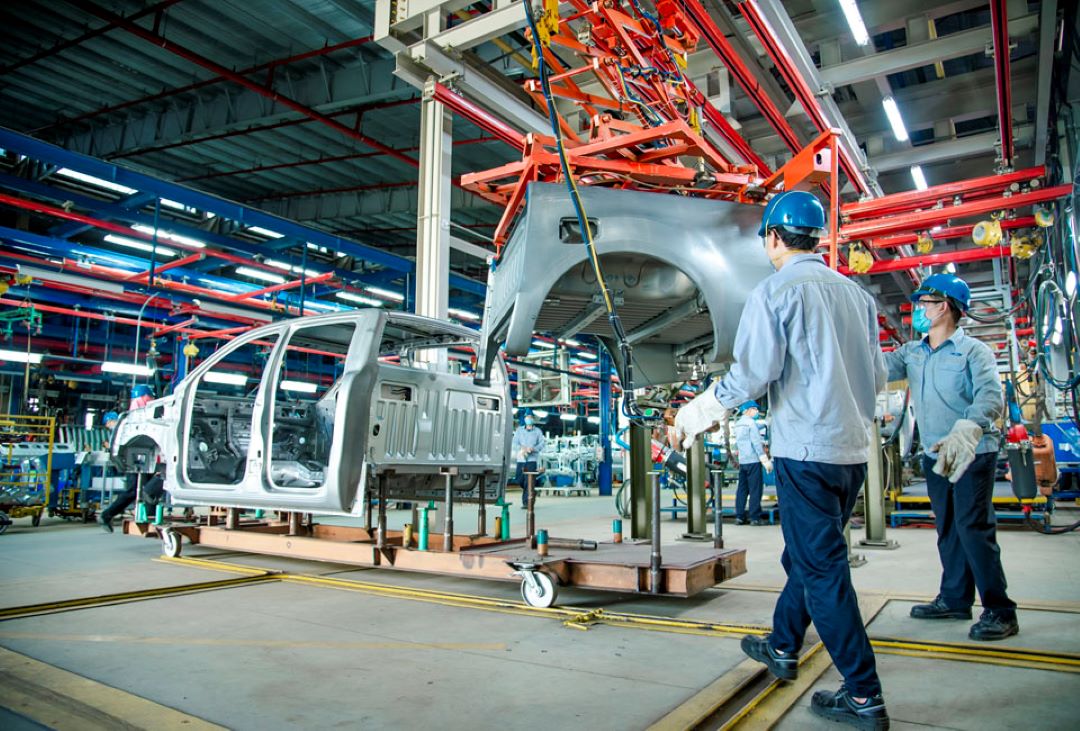HCMC – Despite the U.S. decision to delay a 46% tariff on goods imports from Vietnam for 90 days, industrial real estate stocks were offloaded late last week. Investor concerns have grown over the potential impact of the market-hammering tariff on the sector’s ability to attract foreign capital and investment. Still, experts say Vietnam remains a key strategic destination for global manufacturers looking to expand their production in the long term.
Ripple effects of tariffs
After a record-breaking surge on April 10 following news of the tariff pause, the market reversed course on April 11, with industrial real estate stocks bearing the brunt of the shift. While the VN-Index climbed 54.12 points, or 4.63%, shares of industrial park developers such as Becamex IDC (HOSE: BCM) plummeted, even hitting the daily lower limit.
Amid unfavorable market conditions, the Board of Directors at Becamex IDC has decided to postpone its plan to publicly issue 300 million shares—a deal considered one of the largest in Vietnam’s capital market history. The move aims to protect shareholder interests.
Kinh Bac City Development Holding Corp (HOSE: KBC) has also responded to the market volatility by delaying its annual general meeting. The company announced on April 8 that the meeting would be rescheduled, with a new deadline set for no later than June 30.
On the stock market, KBC shares faced a wave of sell-offs, hitting the daily floor for four consecutive sessions prior to news of the U.S. postponing the steep tariff. By the end of the week, however, the stock held steady at VND23,700 per share, unchanged from the previous session.
In addition to KBC and BCM, several other industrial real estate stocks also came under heavy selling pressure following the U.S. announcement of a 46% tariff on goods imports from Vietnam. Shares of companies, such as Sonadezi Chau Duc (SZC), Saigon VRG Investment (SIP), IDICO (IDC), and Long Hau Corporation (LHG), all recorded sharp declines as investors reacted to the news.
These market movements reflect investor concerns over the U.S. reciprocal tariffs on products from Vietnam. Analysts warn that such tariffs could dampen leasing demand from export-import businesses and foreign manufacturers (FDI), potentially weighing on the performance of industrial park developers.
MBS Securities has also noted that industrial real estate is among the sectors most negatively affected by the U.S. reciprocal tariff.
Infrastructure upgrades key to long-term FDI appeal
In its report assessing the impact of U.S. reciprocal tariffs on Vietnam, Vietcap Securities warned that the country’s competitiveness in attracting foreign direct investment could be undermined.
In recent years, Vietnam has received a strong wave of FDI, particularly in manufacturing, technology, and electronics. Key advantages such as low labor costs, improving infrastructure, and favorable trade policies have positioned the country as an attractive destination for global investors and a relocation option for companies seeking to diversify away from China. Domestic industrial infrastructure developers have seized this momentum by expanding their operations and accelerating the development of new industrial zones.
However, Vietnam’s investment climate is now facing challenges from the new U.S. tariff policy.
The global trade tensions have sparked significant concern among businesses. Although the U.S. tariff has been temporarily suspended for 90 days to allow time for negotiations, lingering uncertainty may prompt investors to delay new capital commitments to Vietnam.
Dr. Huynh Thanh Dien said that while existing FDI projects are expected to remain operational, uncertainty over tariffs could delay new or pending investments. Investors are likely to adopt a wait-and-see approach, monitoring market developments before making final commitments.
Experts also cautioned that if the 46% reciprocal tariff is enforced, many multinational companies may shift their search to alternative production sites with lower trade risks. The technology and electronics sectors, which have increasingly relied on Vietnam as a manufacturing base, may need to reconsider their investment strategies as rising costs threaten to erode their competitiveness.
Sharing the same view, Dan Ives, an analyst at Wedbush, warned that technology firms may need to reconsider their production strategies in Vietnam. The production shift from China to Vietnam—previously viewed as a way to avoid trade barriers—may no longer be the optimal path. Consequently, Vietnam’s industrial zones could miss out on a wave of major foreign investors.
Still, analysts emphasized that it is too early to determine the actual impact of the policy. Investors are advised to stay patient and wait for official updates and the outcome of bilateral negotiations.
Experts believe that the new tariff policy could weigh heavily on Vietnam’s industrial real estate market in the short term. However, in the long run, global firms are expected to continue viewing Vietnam as a strategic base for manufacturing expansion. David Jackson, CEO of Avison Young Vietnam, said the country maintains its appeal as an investment destination thanks to its skilled workforce, competitive production costs, strategic location, and effective FDI incentives. These advantages, he added, will support the sector’s recovery in the future.
Analysts believe Vietnam still has a strong foundation to navigate trade challenges, thanks to its negotiation capabilities and an extensive network of trade agreements.
To overcome these hurdles, it is essential for the Government to strengthen strategic trade partnerships while continuing to improve workforce skills and infrastructure. Such efforts would reinforce Vietnam’s role in the global supply chain, enhance the investment climate, and help shift the economy toward high-tech sectors, reducing reliance on low-cost labor.
As competition from other markets intensifies, it is essential for local authorities and businesses in Vietnam to fast-track infrastructure improvements and enhance workforce capabilities. Without timely and strategic preparation, the country risks losing out on potential investment opportunities in an increasingly competitive global landscape.
Finance-Real Estate Forum 2025
The event is scheduled to take place in HCMC on May 8, with the participation of over 120 distinguished guests, including leading domestic and international experts, senior officials from relevant ministries and agencies, as well as executives from real estate firms, commercial banks, and various financial institutions.
Interested readers are advised to register at https://forms.gle/FwqLtsZf5L7shY4FA









